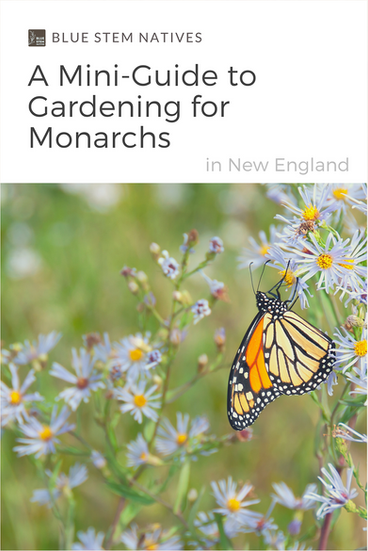Huzzah! The Monarchs have arrived!
- bluestemnatives
- Jun 22, 2024
- 2 min read
Updated: Mar 8, 2025

Monarch butterflies have officially returned to New England from their incredible journey from Mexico. We had a confirmed sighting at Blue Stem Natives yesterday! Luckily we have common milkweed (Asclepias syriaca) growing all around the back of the greenhouse and the Monarch butterfly laid egg after egg on these plants. Monarch butterflies know to lay their eggs on milkweeds* as it's the only genus of plant that their caterpillars can eat. See the egg if you zoom in on the photo. It's quite possible that if you bring home some milkweed in pots from Blue Stem this weekend you'll have some Monarch eggs on the leaves.
The Monarch butterfly is being threatened with potential extinction. From habitat loss to pesticide/insecticide spraying (yes even those "organic" pesticides/insecticide) to people removing milkweeds from their land. We need to plant more milkweed, and we need to not spray it to kill any insects that land on it or interact with it as a flower visitor.
So...What do you have in your garden to support this incredible, and sadly at-risk of going extinct, insect? And what else can you do to help?

Plant milkweeds native to New England and get them from reputable growers who can confirm no insecticides were used in the growing of the plants. Avoid big box stores. Do NOT buy tropical milkweed (Asclepias curassavica).
Plant additional native nectar plants.
Don't spray your yard to kill insects.
Add a garden sign to educate others on the plight of the Monarch. We carry some Monarch signs, you can also certify your yard as a Monarch Way Station here.
*Remove any black swallowwort from your property or with permission from other places. It's in the Asclepiadaceae family so it's confusing to the Monarch, but its not native and incredibly invasive here. It kills Monarch caterpillars when the Monarch butterfly accidentally lays her eggs on it. You can read more to identify it here.
There are other amazing insects who need milkweed too, so don't assume something on your milkweed shouldn't be there if it's not a monarch caterpillar.
Lastly, recognize that about 90% of our native insects that eat plants are specialists just like the Monarch. And the best thing you can do for all of them is to PLANT NATIVE. Want to help pollinators in general? PLANT NATIVE!
Read our e-book, "A Mini-Guide to Gardening for Monarchs" all about this incredible insect to learn more! See some misc pages below. Rumor also has it that we are putting out some pre-planned Monarch garden kits this week. You can ask to be notified when they are in stock here.
Huzzah and happy planting!


.png)












